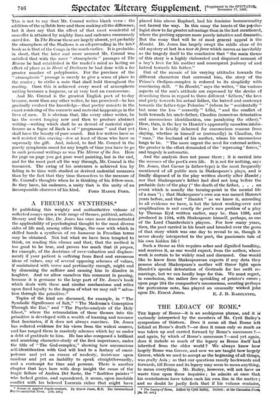A FREUDIAN SYNTHESIS.*'
Ix publishing this weighty and authoritative volume of collected essays upon a wide range of themes, political, artistic, literary and the like, Dr. Jones has once more demonstrated the applicability of psychological thought to the most diverse sides of life and, among other things, the case with which in skilled hands a synthesis of res humanae in Freudian terms may be obtained. Not but what we have been tempted to think, on reading this climax and that, that the method is too good to be true, and proves too much that (a propos, for example, of the doctrines of over-valuation and displace- ment) if your patient is suffering from fixed and erroneous ideas of values, any of several opposing schemes of values, if maintained with verve and pertinacity enough, might end by disarming the sufferer and causing him to dissolve in laughter And we allow ourselves this comment in passing, because it is germane to the large part of Dr. Jones's book which deals with these and similar mechanisms and relies upon fixed loyalty to the dogma of -what we may call-" salva- tion through the primitive."
Topics of the kind are discussed, for example, in "The Symbolic Significance of Salt," "The Madonna's Conception Through the Ear," and "The Psycho-analysis of the Holy Ghost," where the retranslation of these themes into the primitive is developed with a wealth of learning and resource that fascinates, if it does not always cenvince. Dr. Jones has collated evidence for his views from the widest sources, and has ranged them in masterly schemes which lay us under a debt of gratitude to him. He has also composed a brilliant and searching character-study of the first importance, under the title of "The God-complex," showing how unconscious self-identification with God will lead to a fantasy of omni- potence and yet an excess of modesty, insistence upon candour and yet an inability to speak straightforwardly, and a contempt for time and persons. There is another chapter that lays bare with deep insight the cause of the tragic failure of Andrea Del- Saito, the "faultless painter" who lacked genius, and squandered, it seems, upon insoluble conflict with his beloved Lucrezia riches that might have • Exsage in Apied Prychaattalpit. By Ernest Jones, 1LD, The International Psyche-analytical Press, [18s, net.,1 placed him above Raphael, had his feminine homosexuality not barred the way. In this essay the tenets of the psycho-
logist show to far greater advantage than in the last mentioned, where the probing appears more purely intuitive and dramatic. But the essay that will be of most general appeal is the
Hamlet. Dr. Jones has largely swept the riddle clear of its old mystery at last in a tour de force which moves as inevitably as the tragedy itself to the conclusion that " -the main theme
of this story is a highly elaborated and disguised account of a boy's love for his mother and consequent jealousy of and hatred towards his father."
Out of the mosaic of his varying attitudes towards the. different characters that surround him, the story of the Prince's Oedipus-complex is reduced to its simplicity with
convincing skill. "In Hamlet," says the writer, "the various aspects of the son's attitude are expressed by the device of describing them in regard to three different 'fathers,' the love and piety towards his actual fabler, the hatred and contempt
towards the father-type Polonius " (whom he " accidentally " but none the less " correctly " kills), "and the conflict of both towards his uncle-father, Claudius (conscious detestation and unconscious identification, one paralyzing the other)." Here, then, is the key to Hamlet's apparently causeless inhibi- tion ; he is fatally debarred for unconscious reasons from slaying, whether in himself or (outwardly) in Claudius, the "man," the husband of his mother, whom his unconscious longs to be. "The more urgent the need for external action, the greater is the effort demanded of the ' repressing ' forces," and tragedy is automatic.
And the analysis does not pause there ; it is carried into- the recesses of the poet's own life. It is not for nothing, says
Dr. Jones, that Caesar (a father-type) is the most frequently
mentioned of all public men in Shakespeare's plays, and is finally disposed of in the play written shortly after Hamlet ;
nor that Shakespeare's father had died not long before the
probable date of the play (" the death of the father, . . . an, event which is usually the turning-point in the mental life
of a man ") ; that Shakespeare's own son was named Hamnet years before, and that " Hamlet " as we know it, according to all evidence we have, is but the latest working-over and
amplification to suit exactly the poet's own problem of a play
by Thomas Kyd written earlier, may be, than 1586, and produced in 1594, with Shakespeare himself, perhaps, as one of the Lord Chamberlain's players. For how many years, then, the poet carried in his heart and brooded over the germ of that story which was one day to reveal to us, though it never clearly interpreted to the poet, the passionate tale of his own hidden life
Such a theme as this requires sober and dignified handling, and receives it, as one would expect, from the author, whose work is certain to be widely read and discussed. One would- like to know from Shakespearean experts if any data they possess about Shakespeare's mother will throw light upon- Hamlet's special detestation of Gertrude for her swift re- marriage, but we can hardly hope for this. We must regret,. in conclusion, the rather free sprinkling of printer's errors ; upon page 284 the compositor's unconscious, scenting perhaps the portentous note, has played an unusually wicked joke


























































 Previous page
Previous page